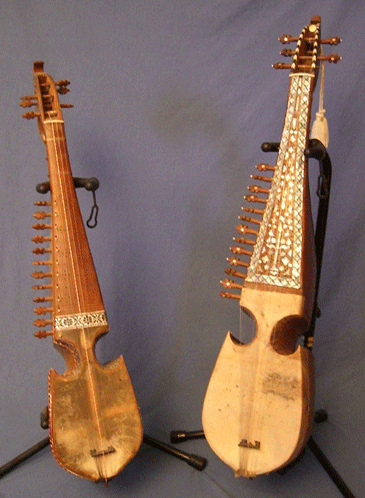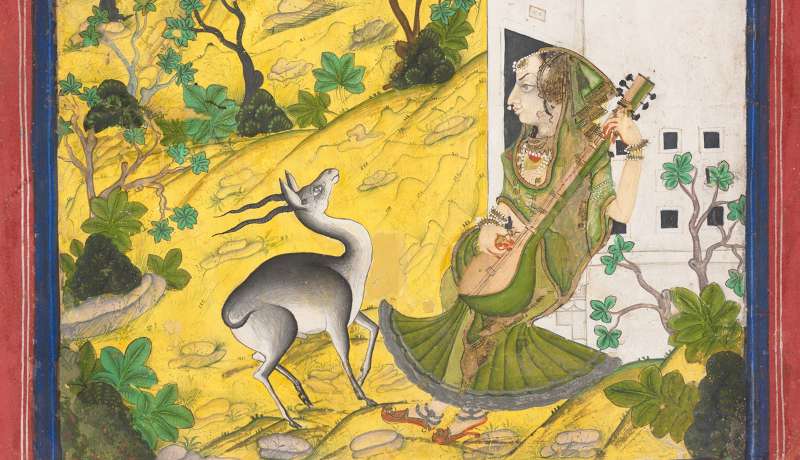FWP:
Like the previous verse, this one too, as Nazm notes, poses a rhetorical question. In both cases the question is a broad one with a mystical or cosmic scope. And in both cases the question is delicately balanced between an interrogation of God's treatment of humans, and an uncertainty about human responsiveness to God's presence and commands.
As Azad's account of Mir Dard make clear, Sufis have sometimes had a favorable attitude toward samaa(( , or listening to music; but it's also true that very often they've been opposed to it. The resulting controversies have been vehement, and in some circles the issue remains contentious today. Some Sufi orders disapprove on principle of all religious uses of music, while others make a (carefully controlled) place for it in their practice. Mir Dard, as both a poet and a Sufi, is a particularly interesting case; for discussion of these controversies and his somewhat ambivalently expressed attitude toward music, see Annemarie Schimmel's Pain and Grace (Leiden: E. J. Brill, 1976), especially pp. 53-57. Ghalib and his original audience would have been well aware that the mystical use of music, as an approach to the Divine, was a theological hot potato. Whatever else Ghalib is doing in this verse, he's also throwing a hot potato into a hornets' nest (I know, I know, it's a horrible image).
Thus it's not surprising that the verse can be understood in ways that might well suit the predilections of different listeners. If you're opposed to the use of music for mystical experience, you can say: 'Good question! As this question shows, music is just another intoxicant like wine, and its power can knock you out or leave you swooning just as wine can. Like wine, music can wreck you; it can destroy your proper self-control and piety. So it's clear that 'that [divine] voice' is by no means present in the lute and rebeck.'
And if you believe that music is a legitimate part of mystical experience, you can say: 'Why, that's an easy question to answer! Music transports you outside your petty this-worldly self, it renders you 'self-less' [be-;xvud] in the way that great mystics have always desired. Listening to music, you reach a higher state that is a close cousin to mystical oblivion [fanaa], so that outsiders might indeed think your life was leaving your body. This 'self-lessness' is the human response to the divine Presence. So the very fact that listening to music can transport you outside yourself is clear proof that 'that [divine] voice' is indeed present in the lute and rebeck.'
Needless to say, it's impossible to tell from this verse what Ghalib himself thought about the mystical use of music. All we can say is that he presents music as a powerful force that can sweep the listener away.
For more on the wordplay involving dam , see {1,3}. There's also, as Owen Cornwall points out, the excellent echo effect between samaa(( and samaa))ii . Owen provides an extended mystical meditation on the verse that situates it close to the heart of Sufi theory and practice. Arthur Dudney (who was also, like Owen, a graduate student at Columbia at the time) offers an original and piquant reading that adds a powerful extra dimension to the first line, though the connection with the second line then becomes a bit tenuous.


Azad:
[The poet and Sufi Khvajah Mir Dard] was well skilled in music. Well-known and accomplished singers used to sing their compositions before him, to receive his correction. A raag is a thing full of emotional effect. The Greek philosophers and the ancient learned men have determined it to be a branch of mathematics. It opens the heart and exalts the spirit. For this reason, some circles among the practitioners of Sufism have treated it as a form of worship. Thus on the second and the twenty-fourth of every month it was customary for the well-known masters of music, [the caste of musicians called] Doms, singers, accomplished persons, and people of taste to gather together and sing mystical pieces. These dates were the death anniversaries of certain of his elders. Muharram is the month of grief; thus on the second [day], instead of songs, there was elegy-recitation.
==Azad: Pritchett and Faruqi, p. 178